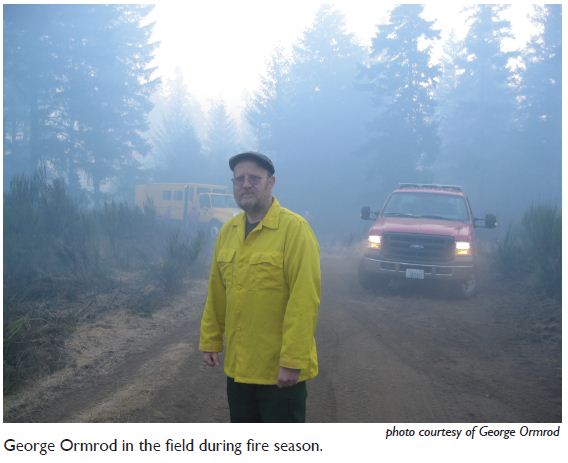Fire Camp, or, How I Spent My Summer Vacation.By George Ormrod
For those who do not know, the Department of Natural Resources is the state's largest on-call fire department. Every summer a majority of agency employees participate in fighting forest fires. We are each paid our regular salaries plus applicable overtime. In May I was given the chance to take a fitness test. After I passed the one mile walk test with a 14 minute score, I qualified as a camp helper. I jumped at the chance to break free from my soul crushing cubicle. 2012 was one of the driest and worst wildfire seasons on record. In September, I, along with two fellow DNR employees in Olympia, was dispatched to the ominously named "Apache Pass Fire." This turned out to be a big grass fire that was almost out when we got there. We spent three days at the Lincoln County fairgrounds hanging around the supply trailer passing out a few supplies and drinking Gatorade. Driving home on a very smoky Interstate 90, we were diverted to the Yakima complex of fires in Central Washington. This was a series of 75 fires started by a lightning storm in early September. We went to a massive camp at the fairgrounds in Ellensburg, along with about 400 firefighters and support personnel. We lived in tents and my job was to get up at 3:00 a.m. to load up a truck taking food to a satellite camp near Chinook pass. We usually worked 15 hour days. A commercial kitchen with large mess tents was set up in our camp and we were fed nearly 6000 calories a day. This is probably about right for someone actually fighting the fire, but a little much for support personnel. Later, I was sent to the forward camp near Chinook Pass. I was put in charge of the supply hut for a few days and then worked as general camp helper. Here, I actually got to deliver supplies to the fire line on parts of the Wild Rose Fire. Each camp was made up of local, state, federal and tribal government firefighters and support personnel. They are a part of the Incident Management System which is a cadre system that can mobilize anywhere in North America to fight wildfires. Under this system, numerous private contractors are also hired, ranging from companies that supply the sani-cans, shower trucks, field kitchens, and hand wash stations to fully equipped wildfire fighting crews, trucks and aircraft. Prison inmate crews are also used. The state or federal government foots the bill for most of this depending on whose land the fires occur. Millions of dollars are spent on each fire. Wildfires are big business! Most of the upper echelon folks in the Incident Management System are current or retired state, local and federal employees with years of wildfire experience. In fire camp, the day starts by 6:00 a.m. with a briefing for firefighters before going on shift. There are also smaller night crews on the fire line. With the cooler temperatures at night, wildfires usually subside somewhat before picking up in the day because of increased wind and heat. The support personnel in camps also consist of communication, press, command, logistic and financial personnel. The finance people purchase supplies and record all the firefighter and support team hours. In October, I was at the Powerline 2 fire north of Shelton for a few days. I worked at the supply trailer and got my clothes incredibly smoky delivering supplies to the front. The public was very supportive everywhere as they were always coming into camp donating pastries, cookies, cakes and even socks and toilet paper. After all the calories and junk food we were given, I was terror stricken as I got on the bathroom scale after returning from each fire. I lucked out because I did not gain any weight! My hope is that after I retire I can still work fires in the summer. George Ormrod lives in Rochester and wrote this essay on his own time.
Back to Home page. |

 I have worked for the Washington State Department of Natural Resources (DNR) since 1995. This year I got to embark on a new adventure: for the first time, I got to go in the field during fire season and work in firefighting support camps.
I have worked for the Washington State Department of Natural Resources (DNR) since 1995. This year I got to embark on a new adventure: for the first time, I got to go in the field during fire season and work in firefighting support camps.